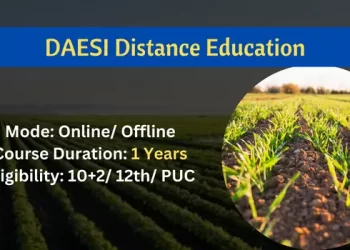Diploma in ECE Distance Education?: The distance Diploma in Electronics Communication Engineering does not offer distance modes, but this course is available in regular modes. The admission is ongoing. The diploma in ECE courses application fee is between Rs 500/- to 1500/-. The application form submission the last date is 15 April 2024* for academic session 2024.
Diploma in ECE Distance Education Admission?
Diploma in ECE Distance Education Admission accepted under the regular modes. The admission is ongoing now. This course offers many university lovely professional universities, Amity University, Chandigarh University, Mangalayatan University and many more.
The diploma in ECE course Duration is three years, Which is a 6-semester course. This course’s admission is based on the last exam marks obtained, and the candidates must meet eligibility criteria. students must have a 45% average in their 10th or 12th grades. The course fee is between Rs 12,000 to 58,000/-.
Those with a distance learning BSc in psychology can find employment as service engineers, field engineers, and electronics engineers, among other professions. An annual pay of INR 3.6 to 8 LPA would be offered for these positions. The UGC and DEB have approved this online degree program. Applications for this course will be accepted until July 2024.
Diploma in ECE Distance Education Admission Latest Updates (April 2024)
- Diploma in ECE Distance Education open learning program is not offered by universities in distance learning mode, in India as per UGC guidelines.
- A diploma in ECE Distance Education was offered in the past by universities but the course was closed in open distance learning mode after the UGC instructions.
- When UGC changes its guidelines, we will update you about the Diploma in ECE Distance Education course details.
What is a Distance Diploma in Electronics Communication Engineering?
One well-known and reasonably priced degree program is the distance-learning Diploma in Electronics Communication Engineering. This course’s curriculum is built around standard disciplines. This course is being offered by DAIT, SMU, IGNOU, and Annamalai University. Candidates are eligible if they received a 45% on their 10+2 exam.

Why Study for a Distance Diploma in Electronics Communication Engineering?
- Affordability: Those who are unable to pay the increased tuition for a traditional Diploma should consider distance learning.
- Flexibility: In addition to its other benefits, this course appeals to a lot of candidates because of its flexibility.
- Assurance Career: With this degree, you can apply for positions as a service engineer, field engineer, and electronics engineer.
Diploma in ECE Distance Education Highlights
| Type of Course | Diploma |
| Full-Form | Diploma in Electronics & Communication Engineering. |
| Approved By | DEB-UGC |
| Admission Process | Merit-Based/Entrance Exam |
| Study Mode | Distance Education/ Online/ Correspondence |
| Duration | 3 Years |
| Age Limit | No specific age limit |
| Minimum Percentage Required | 45% |
| Eligibility | 10+2 from a Recognized Educational Board |
| Average Fee | INR 12,000 – INR 58,000 per annum |
| Similar Course Options of Study | Master in Electronics & Communication Engineering, Bachelor in Electronics & Communication Engineering, etc. |
| Average Salary | INR 3 LPA – INR 5.5 LPA |
| Employment Roles | Electronics R&D engineer, Electronics Technician, Electronics Engineer, Embedded Engineer, etc. |
Is a Diploma in ECE Distance Education Worth it?
Yes, this distance diploma course through DL mode can be worth it if you get an education in this program from a popular engineering institute in India.
- Skills: This course will improve your IT Skills. Some most important skills taught through this distance diploma are Electronic Device Circuit Making, Communication Skills, Electronic Drawing, Communication System making, etc.
- Time Flexibility: Students enrolling in the Distance Diploma in Electronics Engineering Communication can study from anywhere globally without ever leaving their homes or places of employment. Not having to go to school every day is unquestionably advantageous for those with impairments.
- Fee and cost: If we compare full-time and distance learning diplomas in the same speciality, distance learning will be cheaper. The average academic fee is between INR 12K and 58K per annum.
- Earn While You Learn: It is not essential to take a vacation for work or business travels while enrolled in this diploma program. The length of service is not interrupted in this instance, and the topics covered may be applied immediately to the workplace.
Eligibility for Diploma in ECE Distance Education?
For admission in the course Diploma in Electronics & Communication Engineering, the Student must meet the below eligibility criteria:
- Students have to be qualified for class 10th with a recognized board
- A minimum of 45% of marks is required in class 10th
- 10+2 (Vocational) pass students/ITI pass students can get admission in the second year.
Diploma in ECE Distance Education Admission Process?
Step 1. To apply for admission to the university, go to the official website.
Step 2. Candidates need to fill out an online application form.

Step 3. Applicants need to fill in all the correct details.
Step 4. Candidates should make payment through credit/Debit cards for the application fee + entrance exam fee.
Step 5. A candidate can also make a cash payment through a bank e-challan.
Step 6. The candidate will receive an email and SMS confirming the registration.
Step 7. Take out the fee receipt.
Documents required for Diploma in ECE Distance Education
- 10+2 /UG/PG certificate
- An Aadhar card is required for verification
- Pan card
- Date of birth certificate
- Domicile
- Caste certificate
- Passport size Photo
Diploma in ECE Subjects
| 1st Year | |
| Semester-I | Semester-II |
| Communication English | Applied Mathematics II |
| Applied Mathematics | Engineering Physics II |
| Engineering Physics I | Engineering Chemistry II |
| Engineering Chemistry I | Engineering Graphics |
| 2nd Year | |
| Semester-III | Semester-IV |
| Electrical Circuits and Instrumentation | Linear and Digital ICs |
| Electronic Devices | Computer Hardware and Networking |
| C Programming | Industrial Electronics |
| Microprocessor | Object Oriented Programming |
| 3rd Year | |
| Semester-V | Semester-VI |
| VLSI | Embedded Systems |
| Microprocessor and Microcontrollers | Communication Engineering – II |
| Communication Engineering – I | M Television Engineering |
| Robotics | Project |
Benefits of Online Diploma in Electronics and Communication Engineering
- The course also covers productivity growth in various industries, including energy, oil, agriculture, communications media, television, etc.
- This course teaches students how to manage manufacturing processes, assure their safety during installation and operation, comprehend digital electronics, and test their effectiveness.
- They are instructed on using, comprehending, and managing electronic circuits, signs and frames, power electronics devices, VLSI, Applied electromagnetic theories, PC Engineering, and other technologies.
Career Prospects for Diploma in ECE
More employment options are available to engineers in the electronics field than at any other time in history. As a result of electronics engineers’ work, they also design, develop, and produce new technological systems in areas such as computer networks, signal processing, telecommunications, wireless systems, integrated circuit design, optoelectronic systems, and software development.
Every second aspirant desires to study electronics and communication engineering because of the expansion, career chances, income range, and ongoing industry growth.
The consumer electronics industry, telecommunication and IT companies, hardware manufacturing, mobile communication (2G, 3G, 4G), internet developments, power electronics, and other industries like steel, oil, and substance manufacturing are all potential career paths for electronic engineers.
Diploma in ECE Distance Education Salary
With a Diploma in ECE, students can get jobs in both the public and private fields. The average income for someone with a Diploma in ECE is between INR 3 LPA and 5.5 LPA. The salary for a Diploma in Electronics and Communication Engineering depends on the student’s specialization, as well as their experience, where they live, how hard they work, and what business they work in. Internships can help students earn more money because they give them more experience.
Diploma in ECE Scope
A diploma in electronics and communication engineering distance education can help students enhance their skills and knowledge professionally in this field. This course covers a wide range of topics, including electronics, telecommunications, and computer engineering. After completing the course, students will be well-prepared for careers in various industries, such as telecommunications, consumer electronics, automotive, aerospace, and defense.
Note: The UGC has not authorized the Engineering course for distance learning in India. Students can pursue the course only in regular mode. The purpose of this article is only to answer pupils’ questions.





